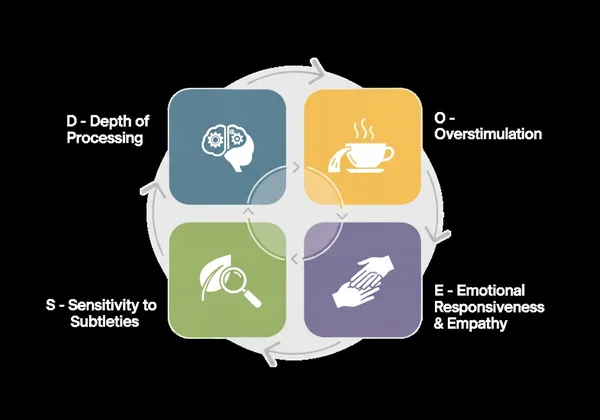اختبار الشخص الحساس الرسمي: اكتشف حساسيتك العالية وازدهر
September 29, 2025 | By Eleanor Reed
هل أنت شخص تشعر بالأشياء بعمق أكبر من الآخرين؟ هل تلاحظ تفاصيل دقيقة في بيئتك، وتمتلك حياة داخلية غنية، وتشعر أحيانًا بالإرهاق من الضوضاء الصاخبة أو الحشود المزدحمة؟ إذا كان هذا يتردد صداه معك، فقد تكون شخصًا شديد الحساسية (HSP). تم تصميم هذا الدليل للشخص شديد الحساسية لمساعدتك على التعامل مع هذه السمة، ليس كنقطة ضعف، بل كنقطة قوة عميقة. هل أنا شخص شديد الحساسية؟ هذا السؤال هو الخطوة الأولى في رحلة تحول لاكتشاف الذات، ونحن هنا لنسير معك فيها. استنادًا إلى الأبحاث الرائدة للدكتورة إيلين إن آرون، سيوضح هذا الدليل الطريق لفهم مواهبك الفريدة ويقدم استراتيجيات قابلة للتنفيذ للازدهار.
تبدأ الرحلة بالفهم. إذا كنت مستعدًا لترى كيف تشكل حساسيتك عالمك، يمكنك استكشاف سماتك الآن.

ماذا يعني أن تكون شخصًا شديد الحساسية (HSP)
كونك شخصًا شديد الحساسية ليس اضطرابًا أو عيبًا؛ إنه مزاج فطري أو سمة شخصية، يُعرف أيضًا باسم حساسية المعالجة الحسية (SPS). يوجد في حوالي 15-20% من السكان، وهذا يعني أن جهازك العصبي أكثر دقة وتناغمًا. فأنت تعالج المحفزات الجسدية والعاطفية والاجتماعية بعمق أكبر من الآخرين. لا يتعلق الأمر بكونك "عاطفيًا" فحسب – إنه اختلاف بيولوجي يأتي بمزايا رائعة وتحديات فريدة.
تفكيك بحث الدكتورة إيلين آرون: نموذج DOES
لتوفير إطار عمل واضح، طورت عالمة النفس الدكتورة إيلين إن آرون نموذج DOES لوصف الجوانب الأربعة الأساسية للحساسية العالية. إذا وجدت أن السمات الأربع تنطبق عليك بشدة، فمن المحتمل جدًا أنك شخص شديد الحساسية.
-
D - عمق المعالجة (Depth of Processing): يفكر الأشخاص شديدو الحساسية بعمق في كل شيء. قبل التحدث أو التصرف، من المحتمل أن تعالج المعلومات بدقة، وتربطها بالتجارب السابقة والإمكانيات المستقبلية. يؤدي هذا إلى الدقة والاجتهاد واتخاذ القرارات الثاقبة، ولكنه يمكن أن يتجلى أيضًا في استغراق وقت أطول لاتخاذ الخيارات أو تجربة شلل التحليل.
-
O - الإفراط في التحفيز (Overstimulation): نظرًا لأنك تعالج كل شيء بعمق شديد، فأنت أكثر عرضة للإفراط في التحفيز. يمكن أن يشعر مركز تجاري مزدحم، أو مكتب صاخب، أو حتى جدول اجتماعي مزدحم بالإرهاق حيث يبذل دماغك جهدًا إضافيًا لإدارة سيل المدخلات الحسية.
-
E - الاستجابة العاطفية والتعاطف (Emotional Responsiveness & Empathy): يشعر الأشخاص شديدو الحساسية بالمشاعر بكثافة كبيرة، إيجابية وسلبية على حد سواء. لديك شعور قوي بالتعاطف، وغالبًا ما تشعر بما يشعر به الآخرون كما لو كان شعورك الخاص. مما يجعلك صديقًا وزميلًا متعاطفًا، ولكنه يعرضك أيضًا للإرهاق العاطفي.
-
S - الحساسية للتفاصيل الدقيقة (Sensitive to Subtleties): لديك وعي حاد بالتفاصيل الدقيقة في بيئتك. قد تلاحظ تغييرًا طفيفًا في نبرة صوت شخص ما، أو صورة جديدة على الحائط، أو روائح خفيفة يغفلها الآخرون تمامًا.

ما وراء الصور النمطية: كيف يبدو الشخص شديد الحساسية في البالغين؟
انسَ الفكرة القديمة بأن كونك حساسًا يعني أن تكون ضعيفًا. إذن، كيف يبدو الشخص شديد الحساسية في البالغين؟ يبدو كالفنان المبدع الذي يرى الجمال في الأمور العادية، والقائد البديهي الذي يستشعر ديناميكيات الفريق قبل أي شخص آخر، والصديق المتفهم الذي يعرف دائمًا الشيء الصحيح ليقوله. يمكن أن يبدو أيضًا كالحاجة إلى وقت إضافي للاسترخاء بعد يوم حافل، وتفضيل المحادثات العميقة وجهًا لوجه على الأحاديث الصغيرة، والتأثر الشديد بالموسيقى أو الفن. إن التعرف على هذه الأنماط هو الخطوة الأولى نحو احتضان ذاتك الأصيلة.
احتضان نقاط قوتك كشخص شديد الحساسية
حساسيتك هي قوتك الخارقة. من خلال فهم ورعاية مواهبك الفطرية، يمكنك تحويل التحديات إلى فرص للنمو والتحقق من الذات. العالم يحتاج إلى المنظور الفريد الذي يقدمه الأشخاص شديدو الحساسية.
قوة التعاطف والمعالجة العميقة
قدرتك على الشعور بعمق ومعالجة المعلومات بدقة تجعلك متعاطفًا وذكيًا بشكل لا يصدق. يتيح لك هذا المستوى العالي من التعاطف تكوين علاقات قوية وذات مغزى مع الآخرين. أنت الشخص الذي يلجأ إليه الأصدقاء للحصول على المشورة لأنك تستمع بانتباه وتفهم وجهة نظرهم. في مكان العمل، تجعلك مهاراتك في المعالجة العميقة محلاً قيمًا لحل المشكلات، ومخططًا استراتيجيًا، ورؤيويًا يمكنه رؤية الصورة الكبيرة وتوقع الاحتياجات المستقبلية.
الإبداع والحدس ومواهب الشخص شديد الحساسية الأخرى
غالبًا ما يمتلك الأشخاص شديدو الحساسية عالمًا داخليًا غنيًا يغذي الإبداع الملحوظ. يربط عقلك الأفكار المتباينة بشكل طبيعي، مما يؤدي إلى حلول مبتكرة وتعبيرات فنية. علاوة على ذلك، يمنحك انسجامك مع الإشارات الدقيقة إحساسًا قويًا بالحدس. هذا "الشعور الغريزي" هو جهازك العصبي الدقيق الذي يعالج المعلومات الدقيقة جدًا، ويوجهك نحو قرارات حكيمة في حياتك الشخصية والمهنية. يمكن أن تؤدي هذه المواهب، عند تقديرها، إلى وجود هادف بعمق. هل تشعر بالفضول؟ يمكنك إجراء اختبار الشخص شديد الحساسية المجاني لمعرفة المزيد.

التغلب على التحديات الشائعة للأشخاص شديدي الحساسية
بينما تعتبر نقاط القوة لكونك شخصًا شديد الحساسية كبيرة، فمن المهم بنفس القدر الاعتراف بالتحديات. يعد تعلم كيفية التغلب على هذه الصعوبات أمرًا أساسيًا لتجنب الإرهاق وعيش حياة متوازنة. وهنا تبرز أهمية إدارة الحساسية العالية كمهارة أساسية.
فهم الإفراط في التحفيز والحمل الحسي الزائد
يعد الإفراط في التحفيز أحد أكثر العقبات شيوعًا للأشخاص شديدي الحساسية. نظرًا لأن دماغك لا يقوم بتصفية المحفزات بنفس قدر الآخرين، يمكنك أن تشعر بالإرهاق بسرعة من أشياء مثل الأضواء الساطعة، والروائح القوية، والأقمشة الخشنة، أو البيئات الفوضوية. يمكن أن يؤدي هذا "الحمل الحسي الزائد" إلى التوتر والقلق، والحاجة المُلحة إلى الانسحاب وإعادة الشحن. إن التعرف على محفزاتك هو الخطوة الأولى لإدارتها بفعالية.
إدارة الشدة العاطفية والإرهاق
الشعور بالعواطف بهذه الكثافة يمكن أن يكون جميلًا ومستنزفًا في آن واحد. قد تختبر فرحًا وحبًا لا يصدقان، ولكن أيضًا حزنًا وقلقًا عميقين. هذه الشدة العاطفية، بالإضافة إلى تعاطفك العالي، يمكن أن تجعلك عرضة لامتصاص ضغوط الآخرين، مما يؤدي إلى الإرهاق والاحتراق النفسي. من الضروري وضع حدود صحية لحماية طاقتك الثمينة.
استراتيجيات عملية للازدهار كشخص شديد الحساسية
النجاح كشخص شديد الحساسية لا يتعلق بتغيير من أنت؛ بل يتعلق بخلق حياة تكرم طبيعتك. يمكن أن تساعدك استراتيجيات الحياة للشخص شديد الحساسية هذه على تسخير نقاط قوتك وتقليل تحدياتك، مما يسمح لك بالازدهار حقًا.
بناء ملاذك: إنشاء بيئة صديقة للحواس
يجب أن يكون منزلك ومكان عملك ملاذك الآمن. لإنشاء بيئة صديقة للحواس، فكر في استخدام إضاءة ناعمة، وسماعات رأس مانعة للضوضاء، وألوان هادئة. قم بترتيب مساحتك لتقليل الفوضى البصرية. خصص زاوية هادئة يمكنك اللجوء إليها عندما تشعر بالإرهاق. يتيح لك التحكم في بيئتك لجهازك العصبي الراحة وإعادة الضبط.

إدارة الطاقة وطقوس الرعاية الذاتية للأشخاص شديدي الحساسية
بالنسبة للأشخاص شديدي الحساسية، الرعاية الذاتية ليست ترفًا – إنها ضرورة. طور طقوس رعاية ذاتية يومية تجدد طاقتك. يمكن أن يشمل ذلك التأمل، قضاء الوقت في الطبيعة، كتابة اليوميات، أو مجرد الاستمتاع بكوب هادئ من الشاي. اجعل النوم أولوية، حيث يحتاج الأشخاص شديدو الحساسية غالبًا إلى مزيد من الراحة لمعالجة أحداث اليوم. تعلم قول "لا" للأنشطة المستنزفة هو خطوة جريئة للحفاظ على الذات.
التواصل بشأن احتياجاتك في العلاقات والعمل
التواصل الفعال بشأن احتياجاتك أمر حيوي. اشرح بلطف لأحبائك وزملائك ما يعنيه أن تكون شخصًا شديد الحساسية. على سبيل المثال، "أستمتع بقضاء الوقت معك، لكنني أشعر بالإرهاق في الأماكن الصاخبة. هل يمكننا الالتقاء في مكان أكثر هدوءًا؟" أو "أقدم أفضل ما لدي من عمل عندما أستطيع التركيز دون انقطاع. هل يمكنني الحصول على بعض الوقت الهادئ المخصص لهذا المشروع؟" يساعد هذا الآخرين على فهمك بشكل أفضل ويعزز علاقات داعمة بشكل أكبر. رحلة فهم الذات مستمرة، ومكان رائع للبدء هو من خلال اختبارنا الرسمي للشخص شديد الحساسية.
خطواتك التالية: فهم أعمق ودعم
يقدم هذا الدليل أساسًا لفهم حساسيتك العالية. الخطوة التالية هي استكشاف كيف تبدو هذه السمة بالنسبة لك شخصيًا. كل شخص شديد الحساسية فريد من نوعه، ويمكن أن يكون اكتساب رؤى شخصية أمرًا تمكينيًا للغاية.
هل اختبار الشخص شديد الحساسية الرسمي مناسب لك؟ كيفية تأكيد سمات الشخص شديد الحساسية.
إذا كنت تهز رأسك موافقًا أثناء قراءة هذا، فقد تتساءل: كيف تؤكد أنك شخص شديد الحساسية؟ أفضل خطوة أولى هي إجراء تقييم ذاتي مصمم لقياس سمة حساسية المعالجة الحسية. يمكن أن توفر الإجابة على الأسئلة المستندة إلى بحث الدكتورة إيلين آرون وضوحًا وتأكيدًا، مما يساعدك على ربط خيوط تجارب حياتك. إنها أداة قوية للوعي الذاتي، تؤكد أن طريقتك في الوجود ليست طبيعية فحسب، بل يشاركها الملايين.
احتضن ذاتك شديدة الحساسية: رحلتك إلى الأمام
كونك شخصًا شديد الحساسية هو سمة فريدة وقيمة تثري حياتك وحياة من حولك. إنه ليس عيبًا يجب إصلاحه، بل هدية قوية تنتظر الفهم والاحتضان. من خلال تعلم كيفية العمل مع جهازك العصبي الحساس، يمكنك التغلب على التحديات برشاقة والاعتماد على نقاط قوتك المذهلة من التعاطف والإبداع والعمق. رحلتك نحو قبول الذات والتمكين بدأت للتو، ونحن هنا لدعمك في كل خطوة على الطريق.
هل أنت مستعد لاتخاذ الخطوة التالية واكتساب فهم أعمق لشخصيتك الفريدة؟ اكتشف حساسيتك من خلال إجراء اختبار الشخص شديد الحساسية المجاني والشامل على صفحتنا الرئيسية اليوم.
أسئلة متكررة حول الأشخاص شديدي الحساسية (HSP)
ما هي خصائص الشخص شديد الحساسية؟
تتلخص الخصائص الأساسية في نموذج DOES للدكتورة إيلين آرون، وهي: عمق المعالجة (التفكير بعمق)، والإفراط في التحفيز (التعرض للإرهاق بسهولة)، والاستجابة العاطفية والتعاطف (الشعور بالأشياء بقوة)، والحساسية للتفاصيل الدقيقة (ملاحظة التفاصيل الصغيرة).
هل كون الشخص شديد الحساسية اضطراب أم مجرد سمة شخصية؟
كون الشخص شديد الحساسية هو سمة شخصية طبيعية وصحية، وليس اضطرابًا طبيًا. إنه يشير إلى اختلاف فطري في الجهاز العصبي المركزي. من المهم عدم تصنيفها كمرض؛ بل يجب فهمها وتقديرها. هذا الدليل لأغراض إعلامية ولا يحل محل المشورة المهنية.
كيف يمكنني التأكد مما إذا كنت شخصًا شديد الحساسية؟
أفضل خطوة أولى هي إجراء تقييم ذاتي مدروس جيدًا. اختبار الشخص شديد الحساسية على موقعنا يستند إلى عمل الدكتورة إيلين آرون ومصمم لمساعدتك على استكشاف ما إذا كنت تتوافق مع السمات الرئيسية للشخص شديد الحساسية. إنها أداة لاكتشاف الذات، وليست تشخيصًا سريريًا.
هل يحتاج الأشخاص شديدو الحساسية إلى مزيد من النوم؟
نعم، يجد العديد من الأشخاص شديدي الحساسية أنهم بحاجة إلى مزيد من النوم مقارنة بالأشخاص الأقل حساسية. نظرًا لعمق معالجتهم، غالبًا ما تعمل أدمغتهم بجهد أكبر خلال اليوم للتعامل مع المحفزات. النوم الكافي (غالبًا 8-9 ساعات) ضروري لجهاز الشخص شديد الحساسية العصبي للراحة ومعالجة التجارب وإعادة الشحن.
ما هي الوظائف الجيدة للأشخاص شديدي الحساسية؟
الوظائف التي تتوافق مع نقاط قوة الشخص شديد الحساسية غالبًا ما تكون مثالية. تشمل هذه الأدوار التي تقدر التعاطف والإبداع والاهتمام بالتفاصيل، مثل المعالجين، والكتاب، والفنانين، والباحثين، والمصممين، والبستانيين. يزدهر العديد من الأشخاص شديدي الحساسية في البيئات الهادئة والعمل الهادف الذي يسمح بالاستقلالية والتركيز العميق.